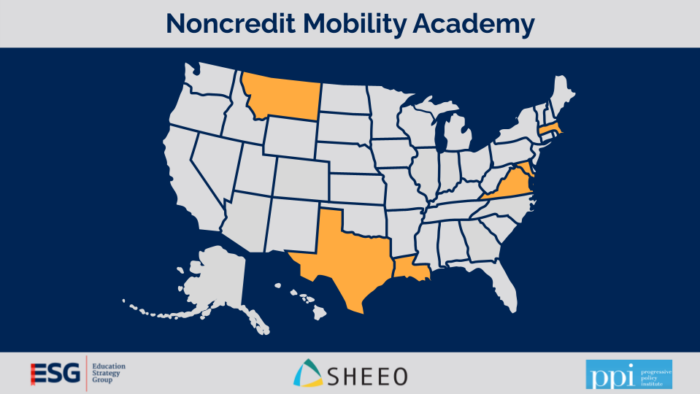Featured Work: Building Economically Mobile Pathways from Noncredit
ESG is partnering with SHEEO and Opportunity America at the Progressive Policy Institute to design and offer the Noncredit Mobility Academy, a two-year initiative launched in the fall of 2023 with generous funding from Ascendium Education Group and the ECMC Foundation to support six states dedicated to building the data and policy infrastructure needed to increase economic mobility for students who start their postsecondary journeys in noncredit programs.
The Noncredit Mobility Academy will promote greater economic mobility for learners who start in noncredit programs by supporting state higher education leaders in each participating state as they develop a vision for postsecondary noncredit workforce education and how it can serve as a starting point on a pathway to a credit-bearing credential or degree.
The Academy will help each state develop a commitment across education and workforce systems to take the policy actions necessary to better count, track, fund, report on, and communicate about the noncredit programs that offer the best opportunity for learner economic mobility.
Through their participation in the Noncredit Mobility Academy, states will build key systems and policies to support students’ economic mobility, including:
- A state-level taxonomy of noncredit programs aligned with key definitions of quality
- A plan to build or improve upon noncredit data collection and reporting
- A set of funding recommendations to support or incentivize enrollment in quality programs
- A communications plan to improve understanding of high-value noncredit opportunities
 Following a competitive application process, six states were chosen to participate in the Academy: Louisiana, Maryland, Massachusetts, Montana, Texas, and Virginia.
Following a competitive application process, six states were chosen to participate in the Academy: Louisiana, Maryland, Massachusetts, Montana, Texas, and Virginia.
Louisiana intends to expand on its current efforts to collect noncredit credential data and knit these data into the state’s new longitudinal data system that will be under the auspices of the Board of Regents.
Maryland, with some of the strongest unit record data on noncredit programs in the country, wants to double down on data usage. They propose to, among other things, evaluate return on investment of current state scholarships and identify ways to expand them to include noncredit.
Massachusetts plans to update their current state-level taxonomies for noncredit programs and begin to collect data on student enrollment and success in those programs.
Montana will leverage current assets around the state to assess the value of noncredit offerings to their local communities and industries, develop shared definitions of noncredit training, and produce guidelines and rubrics to ensure quality offerings that allow participants to move into post-secondary credit programs if they choose.
Texas will build on its extensive work to define, measure, and report on credentials of value to determine how noncredit pathways fit into the state’s understanding of value, especially as the state seeks to implement its new community college funding formula.
Virginia intends to incorporate current noncredit data into the SHEEO agency’s current collection and reporting, while expanding their inventory of programs beyond those currently funded by the state’s Workforce Credential Grant to help more Virginians navigate their options for workforce training.



